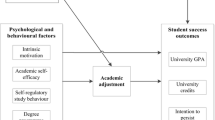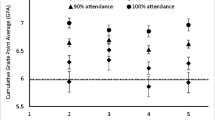Abstract
A process for evaluating non-traditional programs at post-secondary institutions is presented. Three major stages are outlined for conducting the evaluation: 1) the preoperational stages; 2) the implementation stage; and 3) the postoperational stage. A description of how the model has been utilized in evaluating a specific non-traditional graduate program, the Master of Liberal Studies Program, is given. Preliminary results of that evaluation are also outlined.
Similar content being viewed by others
References
Foster, G. and Easton, P. Updating the Model and Goals of an Educational Change Program: A Third Dimension of Formative Evaluation. CEDR Quarterly, 13, 1980, 15–18.
Plakos, M., Plakos, J., and Babcock, R. Workbook on Program Evaluation. Princeton, Educational Testing Service, 1977.
Author information
Authors and Affiliations
Rights and permissions
About this article
Cite this article
Caffarella, R., Drummond, R. Evaluating nontraditional degree programs in post-secondary education. Alternative Higher Education 7, 62–67 (1982). https://doi.org/10.1007/BF01080812
Issue Date:
DOI: https://doi.org/10.1007/BF01080812




